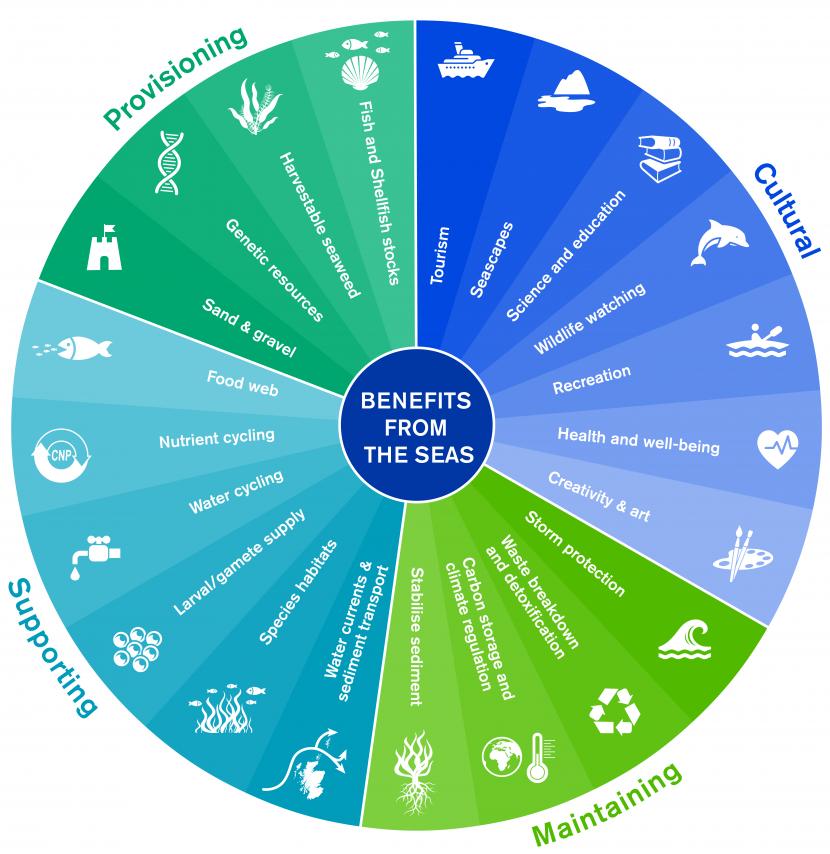If you like a Fish Supper or Scampi and Chips then you should read this.
Scotland’s Marine Ecosystem is over six times the size of its landmass with over 18,000Km of Coastline and its Exclusive Economic Zone is 462,263km2
On the news, we hear a lot about Brexit and fishermen, but our seas are so much more as outlined in this image below:
Scotland’s seas are some of the most diverse on the planet. They are at the confluence of northerly-flowing surface currents and southerly-flowing polar currents and due to this have the basis of being one of the most productive fisheries in the world.
However, in the Scottish Marine Assessment 2020 a decadal review published by the Scottish Government in December 2020, the scientific evidence outlines the following concerns:
- There are consistent long-term trends that Scotland’s sea temperatures are increasing coupled with a change in pH (Acidification) and as a consequence, our seas will become less productive in coming years.
- Industrial Scale fishing is having a major impact on Fish Stocks: 11 “key” fish stocks were assessed in 2018 (mackerel, haddock, cod, herring, hake, whiting, monkfish) of these 46% are overfished
- Of the 31 Marine Protected Areas assessed only 9 have achieved their conservation objectives and the claim that there is a wealth of measures in place to manage fisheries is sadly not true
With improved techniques and equipment for scanning the seabed Trawlers that fish for Langoustines (Scampi) and Scallops that damage seabed habitats and produce a lot of bycatch and discards are working right up and into important spawning ground habitats such as Kelp Forests and Maerl beds ( biogenic reefs ).
But it’s not the fishing community that is to blame as they struggle to survive as our marine resources are in decline, fisheries management of our seas is the real issue. The conflict between the Mobile Fishing Fleet and less impactive smaller Boats that target specific species through Creeling and Scallop diving has been driven by EU and UK Fishing Policies.
So who owns our sea bed around Scotland? The Crown Estate Scotland is an independent organisation (of the Queen and Government) that owns the seabed and collects revenues of which the surplus are paid to the Scottish Government.
Who manages Scotland’s Seas? Marine Scotland which is part of the Scottish Government and takes its direction from Government Ministers with SEPA and Nature Scotland (SNH) Acting as advisors to the government.
So the 2021 Elections at Holyrood are critical and with Scotland Hosting UN Climate Change Conference COP26 this year we need to send a clear message.
Brexit has given us an opportunity to take control back of our seas from Europe and with only having one owner “Scottish Government” it’s up to us to drive policy decisions at Holyrood working with local communities and fishing businesses to find a solution that works for all.
What can I do to make a difference?
Click Book Stay & Scubadog are members of the Our Seas coalition, together we are campaigning for the recovery of Scotland’s coastal seas and fisheries and working to develop sustainable tourism solutions that enrich local communities and reduce our impact on the environment.
The online premier of the coalition film ‘The Limit’ was on the 10th of February at 7pm with an introduction from Professor Iain Stewart of ‘Making Scotland’s Landscapes’ which was filmed 10 years ago and sadly the issues he highlighted then, is still relevant today.
The Limit is a film about restoring the threatened connection between communities and the life in our seas. How can we make a transition towards more sustainable fishing?
The Limit Film to view anytime:
Please join us on the night and feel free to share this invitation widely. For more information on Our Seas coalition visit www.ourseas.scot.
Asking politicians to re-introduce an inshore limit to protect our important inshore marine habitats is a start in the right direction.
Scuba Divers – can be witnesses and also educators to those that don’t have an opportunity to see our marine ecosystem first hand.
For further reading:
Scottish Marine Assessment 2020 Government Report:
Scotland’s Fisheries Management Strategy 2020 – 2030:
Book and Film – “A Life on Our Planet – My Witness Statement and Vision for the Future – David Attenborough Oct 2020
A great resource for understanding the issues in Scotland’s seas:
Find out more about Scotland’s Marine Ecosystem:
https://www.gov.scot/publications/scotlands-marine-atlas-information-national-marine-plan/pages/6/
What do our Ecosystems do for us?
Seasearch a Citizens Science Project that is used by the Scottish & Westminster Governments to help guide policy decisions:
-
Scotland’s Marine Ecosystem is over six times the size of its landmassFebruary 09, 2021 0 comments

Sorry, the comment form is closed at this time.